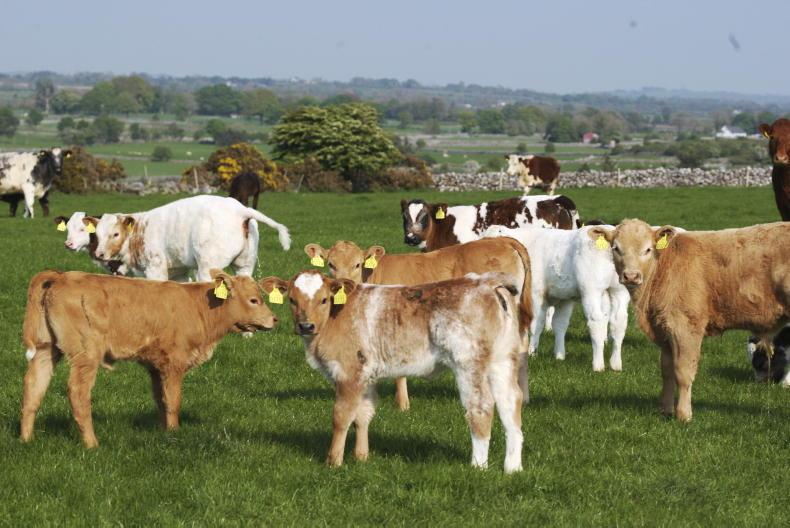The European Commission’s revision of its 2010 Directive on Industrial Emissions on Tuesday will force thousands of family livestock farms to comply with a costly emission protocol designed primarily for large companies, according to the European farmer representative group, Copa-Cogeca.
The group criticised the move which it says classified many family farms as “agro-industrial installations”.
Copa-Cogeca says the revision will multiple by almost tenfold the number of cattle, pig and poultry farms targeted where as “only the largest EU livestock installations were considered under its scope over the past decade”.
The farmer representative group highlighted the contradiction between Tuesday’s decision and recent Commission work to support the EU's need for food autonomy.
It criticised the mixed messaging as “ideological and disconnected” and as a “blow across Europe for livestock farmers”.
Extended scope
As first revealed by the Irish Farmers Journal, as part of the revision of its Industrial Emissions Directive (IED), the European Commission has decided to extend the scope of its proposal to cattle farms and to lower the thresholds for the pig and poultry sector already covered since 2010.

The European Commission is disconnected with the realities of farming, says Copa-Cogeca.
Copa-Cogeca said: “According to the Commission, this would represent only 13% of the EU’s largest livestock farms overall. This is a smart but misleading way of putting it.
Despite the Commission’s impact assessment, the set threshold is a political arbitration
“In Germany and Finland more than 90% of the broilers production will be considered agro-industrial installations while the same share of the French pig, beef and dairy production will also be [included].
“This arbitrary threshold is shocking and shows a profound disconnection with farm realities on the ground.
“Despite the Commission’s impact assessment, the set threshold is a political arbitration that is an unbalanced and partial approach to sustainability.”
Crises piling up
Copa president Christiane Lambert said: “Despite the different crises that are piling up, livestock farmers are making significant efforts to evolve their practices and to best combine productivity and respect for the environment.
“The fact that the European Commission speaks today of agro-industrial installations to describe family farms shows that there is total confusion on what the reality of livestock farming is. “Lowering the threshold so dramatically will severely hit the European model of family farming with additional costs and bottlenecks.”
Copa-Cogeca said it is also concerned about the Commission’s intention to regulate the scope and the thresholds of the covered sectors in the future by means of delegated acts which it says will “make the situation even more opaque and unpredictable”.
The European Commission’s revision of its 2010 Directive on Industrial Emissions on Tuesday will force thousands of family livestock farms to comply with a costly emission protocol designed primarily for large companies, according to the European farmer representative group, Copa-Cogeca.
The group criticised the move which it says classified many family farms as “agro-industrial installations”.
Copa-Cogeca says the revision will multiple by almost tenfold the number of cattle, pig and poultry farms targeted where as “only the largest EU livestock installations were considered under its scope over the past decade”.
The farmer representative group highlighted the contradiction between Tuesday’s decision and recent Commission work to support the EU's need for food autonomy.
It criticised the mixed messaging as “ideological and disconnected” and as a “blow across Europe for livestock farmers”.
Extended scope
As first revealed by the Irish Farmers Journal, as part of the revision of its Industrial Emissions Directive (IED), the European Commission has decided to extend the scope of its proposal to cattle farms and to lower the thresholds for the pig and poultry sector already covered since 2010.

The European Commission is disconnected with the realities of farming, says Copa-Cogeca.
Copa-Cogeca said: “According to the Commission, this would represent only 13% of the EU’s largest livestock farms overall. This is a smart but misleading way of putting it.
Despite the Commission’s impact assessment, the set threshold is a political arbitration
“In Germany and Finland more than 90% of the broilers production will be considered agro-industrial installations while the same share of the French pig, beef and dairy production will also be [included].
“This arbitrary threshold is shocking and shows a profound disconnection with farm realities on the ground.
“Despite the Commission’s impact assessment, the set threshold is a political arbitration that is an unbalanced and partial approach to sustainability.”
Crises piling up
Copa president Christiane Lambert said: “Despite the different crises that are piling up, livestock farmers are making significant efforts to evolve their practices and to best combine productivity and respect for the environment.
“The fact that the European Commission speaks today of agro-industrial installations to describe family farms shows that there is total confusion on what the reality of livestock farming is. “Lowering the threshold so dramatically will severely hit the European model of family farming with additional costs and bottlenecks.”
Copa-Cogeca said it is also concerned about the Commission’s intention to regulate the scope and the thresholds of the covered sectors in the future by means of delegated acts which it says will “make the situation even more opaque and unpredictable”.







 This is a subscriber-only article
This is a subscriber-only article










SHARING OPTIONS: